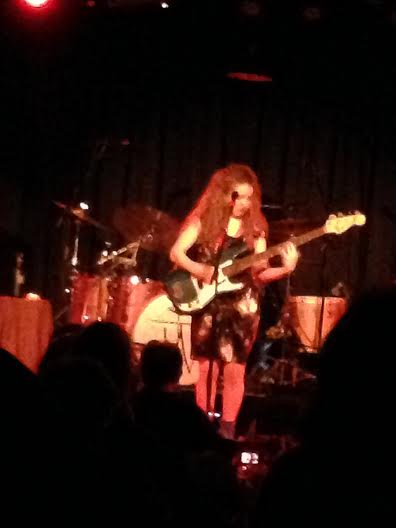 It’s a bit of a schizophrenic touring season for Tal Wilkenfeld.
It’s a bit of a schizophrenic touring season for Tal Wilkenfeld.
Half the time, the Australian bassist is headlining modest sized clubs with her band. The other half, she’s opening huge arena shows for The Who.
Fans in D.C. got to see her at both extremes this month, first at the venerable Birchmere Music Hall in Alexandria, Va., March 15 and then the cavernous Verizon Center in D.C. nine days later on the 24th.
What was surprising is that she didn’t seem to tone her arena show down for the closer confines; nor did she have to make her club show substantially bigger to fill an arena.
Wilkenfeld is a young guitarist turned bassist who took her parents money meant for college and instead went straight to Los Angeles to play music. She got jobs immediately and caught a lot of attention when she played bass with Jeff Beck, most prominently at a 2007 Crossroads Music Festival , where her solo during “Cause We’ve Ended as Lovers” is up to 1.8 million YouTube views.
She’s since performed with the likes of drummer Vinnie Colaiuta (who was part of the Beck band too – and Zappa and Sting before that).
Her current band doesn’t have marquee names, but hold their own with complex and powerful playing especially from guitarist Owen Barry and drummer Tamir Barzilay.
The Who, of course, have a storied list of acts who have opened for them, including Led Zeppelin, AC/DC, the Faces in both of its incarnations, the Kinks, the Pretenders, Lou Reed, Bob Marley and The Clash.
The Who also has a history with bassists. John Entwistle was a monster and made up one of rock’s most formidable rhythm sections with Keith Moon. “My Generation,” which introduced the band to most of the world, has a bass solo, for goodness sake. And the band is currently touring with no less than Pino Palladino.
So it’s no wonder that Wilkenfeld caught the ear of the Who. At 29 she brings a youthful presence to their concerts, where the majority of the audience are closer to the headliners’ post-retirement age. More important she brings a serious minded intent to rock at a time when her contemporaries tend toward more spare, folkie ethereal indie sounds, if not dance and pop.
Wilkenfeld, in small and big shows, is wide ranging enough to make one wonder what her ultimate direction will be. Not every song can have a bass solo; some of her more straight ahead rockers were never built for them. It’s a pleasure to hear her intricate playing on the jazzier numbers. And while she seemed to do more of them in the smaller venue, the benefit of the larger stage is that, through close-ups the video cameras, you could better see her at work.
“Your right hand pinky is incredible,” a fan at the Birchmere called out from the silence (he must have meant her left hand that sweeps up and down the fretboard).
Wilkenfeld didn’t know quite what to say about that. “I think your overalls are incredible,” she said, finally. (It was, after all, Virginia).
Wilkenfeld’s songs, as one might expect, are more angular in approach, as in an Adrian Belew album. There is a minor key approach in her singing that suggested this is a commonality among bass players like Jack Bruce before her. Thinking more on it, you’d almost want to hear her take on Cream’s “Tales of Brave Ulysses” or something.
Instead, her one standout cover (in the club show and not the arena) came from the Smiths, a slowed down version of “How Soon is Now” that well fit the band’s angularity and the slashing singularity of Johnny Marr.
Wilkenfeld doesn’t stick with the bass (nor does she stay with the same model of instrument for more than one song, as a hard-working guitar tech will attest). She perhaps is looking toward a wider presence in rock, so she strums an acoustic guitar during her current single “Corner Painter,” a song that begins to settle in after hearing it win over crowds in two divergent locations.